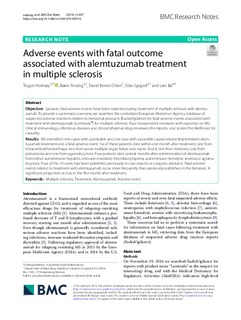| dc.contributor.author | Holmøy, Trygve | |
| dc.contributor.author | Fevang, Børre | |
| dc.contributor.author | Olsen, David Benee | |
| dc.contributor.author | Spigset, Olav | |
| dc.contributor.author | Bø, Lars | |
| dc.date.accessioned | 2019-12-16T12:57:32Z | |
| dc.date.available | 2019-12-16T12:57:32Z | |
| dc.date.created | 2019-09-05T18:21:59Z | |
| dc.date.issued | 2019 | |
| dc.identifier.citation | BMC Research Notes. 2019, 12 (1), 1-5. | nb_NO |
| dc.identifier.issn | 1756-0500 | |
| dc.identifier.uri | http://hdl.handle.net/11250/2633425 | |
| dc.description.abstract | Objective
Sporadic fatal adverse events have been reported during treatment of multiple sclerosis with alemtuzumab. To provide a systematic overview, we searched the centralized European Medicines Agency database of suspected adverse reactions related to medicinal products (EudraVigilance) for fatal adverse events associated with treatment with alemtuzumab (Lemtrada®) for multiple sclerosis. Four independent reviewers with expertise on MS, clinical immunology, infectious diseases and clinical pharmacology reviewed the reports, and scored the likelihood for causality.
Results
We identified nine cases with a probable and one case with a possible causal relationship between alemtuzumab treatment and a fatal adverse event. Six of these patients died within one month after treatment; one from intracerebral hemorrhage, two from acute multiple organ failure and septic shock, one from listeriosis, one from pneumonia and one from agranulocytosis. Four patients died several months after administration of alemtuzumab from either autoimmune hepatitis, immune-mediated thrombocytopenia, autoimmune hemolytic anemia or agranulocytosis. Four of the 10 cases had been published previously in case reports or congress abstracts. Fatal adverse events related to treatment with alemtuzumab occur more frequently than previously published in the literature. A significant proportion occurs in the first month after treatment.
Introduction
Alemtuzumab is a humanized monoclonal antibody directed against CD52, and is regarded as one of the most efficacious drugs for treatment of relapsing–remitting multiple sclerosis (MS) [1]. Alemtuzumab induces a profound decrease of T and B lymphocytes, with a gradual recovery starting one month after administration [2, 3]. Even though alemtuzumab is generally considered safe, serious adverse reactions have been identified, including infections, immune-mediated thrombocytopenia and thyroiditis [3]. Following regulatory approval of alemtuzumab for relapsing remitting MS in 2013 by the European Medicines Agency (EMA) and in 2014 by the U.S. Food and Drug Administration (FDA), there have been reports of severe and even fatal suspected adverse effects. These include listeriosis [4, 5], alveolar hemorrhage [6], neutropenia with staphylococcus infection [7], autoimmune hemolytic anemia with necrotizing leukoencephalopathy [8], and hemophagocytic lymphohistiocytosis [9].
These concerns led us to perform a systematic search for information on fatal cases following treatment with alemtuzumab in MS, retrieving data from the European database of suspected adverse drug reaction reports (EudraVigilance). | nb_NO |
| dc.language.iso | eng | nb_NO |
| dc.publisher | BMC (part of Springer Nature) | nb_NO |
| dc.rights | Navngivelse 4.0 Internasjonal | * |
| dc.rights.uri | http://creativecommons.org/licenses/by/4.0/deed.no | * |
| dc.title | Adverse events with fatal outcome associated with alemtuzumab treatment in multiple sclerosis | nb_NO |
| dc.type | Journal article | nb_NO |
| dc.type | Peer reviewed | nb_NO |
| dc.description.version | publishedVersion | nb_NO |
| dc.source.pagenumber | 1-5 | nb_NO |
| dc.source.volume | 12 | nb_NO |
| dc.source.journal | BMC Research Notes | nb_NO |
| dc.source.issue | 1 | nb_NO |
| dc.identifier.doi | 10.1186/s13104-019-4507-6 | |
| dc.identifier.cristin | 1722039 | |
| dc.description.localcode | © The Author(s) 2019. This article is distributed under the terms of the Creative Commons Attribution 4.0 International License (http://creativecommons.org/licenses/by/4.0/), which permits unrestricted use, distribution, and reproduction in any medium, provided you give appropriate credit to the original author(s) and the source, provide a link to the Creative Commons license, and indicate if changes were made. The Creative Commons Public Domain Dedication waiver (http://creativecommons.org/ publicdomain/zero/1.0/) applies to the data made available in this article, unless otherwise stated. | nb_NO |
| cristin.unitcode | 1920,14,0,0 | |
| cristin.unitcode | 194,65,15,0 | |
| cristin.unitname | Laboratoriemedisinsk klinikk | |
| cristin.unitname | Institutt for klinisk og molekylær medisin | |
| cristin.ispublished | true | |
| cristin.fulltext | original | |
| cristin.qualitycode | 1 | |

